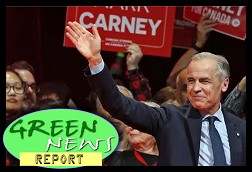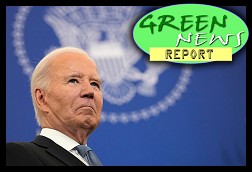 This is our final BradCast of the Biden Era. We've got a lot of mixed emotions on today's program, as you'll discover when you tune in. [Audio link to full show follows this summary.]
This is our final BradCast of the Biden Era. We've got a lot of mixed emotions on today's program, as you'll discover when you tune in. [Audio link to full show follows this summary.]
Among our coverage...
- Vile Congressional Republicans, such as Alabama's Sen. Tommy Tuberville, Kansas' Roger Marshall and many of their far-right media pals are targeting the victims of the Los Angeles Fires as part of their latest reprehensible political strategy. They're calling for "conditions" and "strings attached" before agreeing to aid Americans who have lost everything out here in these horrific, ongoing fires. They are whipping up disinformation echo chambers to convince themselves that it was something other than climate change-fueled dry weather and hurricane force winds to blame for the past week's unspeakable disaster and death. I've got a word or two in response on today's program, including some thoughts about the fact that California gives five times more to the federal government in tax dollars than we receive back in return. You're welcome, Senators --- and all of your loser MAGA buddies banging that same pathetic, loathsome drum.
- Speaking of fossil fueled climate change deniers, Donald Trump's nominee to head up the Dept. of Energy, fracking company CEO Chris Wright, doesn't believe wildfires have anything to do with climate change. And Trump's pick to lead the Environmental Protection Agency, former Rep. Lee Zeldin of New York, used to call for reducing our reliance on fossil fuels. Now tapped for Trump's EPA, he's singing a different tune, as Desi Doyen reports today in her coverage of Zeldin's U.S. Senate confirmation hearing on Thursday.
- In what suffices for good news today, you may recall that, just before Christmas, President Biden, who vowed during his 2020 campaign to end the federal death penalty (he didn't), mercifully and morally commuted the sentences of 37 of the 40 people on federal Death Row to life in prison without the possibility of parole. (He should have done the same for the other three, as reprehensible as they may be. The Government shouldn't be in the business of killing its own citizens.) But on Wednesday, according to a scoop from LAW DORK's Chris Geidner, Attorney General Merrick Garland officially withdrew federal approval for the use of single-drug lethal injections of pentobarbital in federal executions. That may slow down, at least, another killing spree by Donald Trump, who ordered the executions of 13 federal Death Row inmates during the final six months of his first term in office. That, after a total of just three people had been executed under all previous Presidents from the years 1975 through 2020.
- And, speaking of warnings of what is coming --- or already here --- in a 17-minute prepared speech (transcript) from behind the Resolute Desk in the Oval Office, President Joe Biden issued his Farewell Address to the American people on Wednesday night. He briefly touted his Administration's substantive (and, so far, wildly under-appreciated) record, noting that "It’ll take time to feel the full impact of what we’ve done together, but the seeds are planted and they’ll grow and they’ll bloom for decades to come." He then went on to issue a series of dire warnings that echoed President Eisenhower's 1961 Farewell Address, in which he famously warned of the menace of the then-burgeoning Cold War Military-Industrial Complex. In this case, Biden warned of the dangers of a Tech-Industrial Complex and explained that "an oligarchy is taking shape in America of extreme wealth, power and influence that literally threatens our entire democracy, our basic rights and freedoms and a fair shot for everyone to get ahead." He hearkened back to the push-back against the Gilded Age of the robber barons over a century ago, while charging that Americans are now "being buried under an avalanche of misinformation and disinformation enabling the abuse of power." We share an extended excerpt of those warnings and others --- "the existential threat of climate change", unchecked A.I. development, our corrupted U.S. Supreme Court, a "crumbling" free press --- from Biden's final Oval Office address before Monday's Inauguration of the first convicted felon, adjudicated rapist and adjudicated insurrectionist to ever be sworn in as President of the United States.
- Finally, Desi Doyen joins us for our latest Green News Report with more on the L.A. Fires and the long recovery ahead; more on Trump's Energy Secretary nominee; more on Joe Biden's encouragement to Americans in his Farewell Address to hold the line on climate action in the years ahead...
(Snail mail support to "Brad Friedman, 7095 Hollywood Blvd., #594 Los Angeles, CA 90028" always welcome too!)
|


 Blowing Smoke.
Blowing Smoke. 'Green News Report' 5/6/25
'Green News Report' 5/6/25
 SCOTUS Allowing Publicly-Funded Religious Schools 'Would be a Ground-Breaking Disaster': 'BradCast' 5/7/25
SCOTUS Allowing Publicly-Funded Religious Schools 'Would be a Ground-Breaking Disaster': 'BradCast' 5/7/25 Trump Judge Blocks NC GOP Attempt to Steal 2024 State Supreme Court Election: 'BradCast' 5/6/25
Trump Judge Blocks NC GOP Attempt to Steal 2024 State Supreme Court Election: 'BradCast' 5/6/25 Prosecutors Resign After Trump U.S. Attny Strikes Deal With Felon Cop: 'BradCast' 5/5/25
Prosecutors Resign After Trump U.S. Attny Strikes Deal With Felon Cop: 'BradCast' 5/5/25 Sunday 'Good Buy, Dolly!' Toons
Sunday 'Good Buy, Dolly!' Toons Trump Losing Streak Continues into SECOND Hundred Days: 'BradCast' 5/1/25
Trump Losing Streak Continues into SECOND Hundred Days: 'BradCast' 5/1/25 'Green News Report' 5/1/25
'Green News Report' 5/1/25 100 Daze: 'BradCast' 4/30/25
100 Daze: 'BradCast' 4/30/25 Campaign to 'Impeach Trump Again' Gains Fresh Momentum: 'BradCast' 4/29/25
Campaign to 'Impeach Trump Again' Gains Fresh Momentum: 'BradCast' 4/29/25 'Green News Report' 4/29/25
'Green News Report' 4/29/25 And Then They Came for the Judges...: 'BradCast' 4/28/25
And Then They Came for the Judges...: 'BradCast' 4/28/25 Sunday 'Desperation' Toons
Sunday 'Desperation' Toons Trump EPA Guts Enviro Justice Office: 'BradCast' 4/24/25
Trump EPA Guts Enviro Justice Office: 'BradCast' 4/24/25 'Green News Report' 4/24/25
'Green News Report' 4/24/25 Sunday
Sunday  Largest U.S. Broad-caster Hoaxes Viewers to Help Gut FCC Rules: 'BradCast' 4/23/25
Largest U.S. Broad-caster Hoaxes Viewers to Help Gut FCC Rules: 'BradCast' 4/23/25 FCC on Precipice of Ending All Limits on Corp. Control of Local TV Stations
FCC on Precipice of Ending All Limits on Corp. Control of Local TV Stations GOP Earth Day 2025 Hypocrisies and Dilemmas: 'BradCast' 4/22/25
GOP Earth Day 2025 Hypocrisies and Dilemmas: 'BradCast' 4/22/25 Pope Francis Dies, Trump Still Alive and Criming: 'BradCast' 4/21/25
Pope Francis Dies, Trump Still Alive and Criming: 'BradCast' 4/21/25 Soc. Sec. Expert Warns DOGE of Collapse, Privatization: 'BradCast' 4/10/2025
Soc. Sec. Expert Warns DOGE of Collapse, Privatization: 'BradCast' 4/10/2025 Trump Blinks, Chaos Reigns, Markets Spike Amid Tariff 'Pause': 'BradCast' 4/9/25
Trump Blinks, Chaos Reigns, Markets Spike Amid Tariff 'Pause': 'BradCast' 4/9/25 SCOTUS Deportation Ruling Grimmer Than First Appears: 'BradCast' 4/8/25
SCOTUS Deportation Ruling Grimmer Than First Appears: 'BradCast' 4/8/25 Cliff Diving with Donald: 'BradCast' 4/7/25
Cliff Diving with Donald: 'BradCast' 4/7/25
 VA GOP VOTER REG FRAUDSTER OFF HOOK
VA GOP VOTER REG FRAUDSTER OFF HOOK Criminal GOP Voter Registration Fraud Probe Expanding in VA
Criminal GOP Voter Registration Fraud Probe Expanding in VA DOJ PROBE SOUGHT AFTER VA ARREST
DOJ PROBE SOUGHT AFTER VA ARREST Arrest in VA: GOP Voter Reg Scandal Widens
Arrest in VA: GOP Voter Reg Scandal Widens ALL TOGETHER: ROVE, SPROUL, KOCHS, RNC
ALL TOGETHER: ROVE, SPROUL, KOCHS, RNC LATimes: RNC's 'Fired' Sproul Working for Repubs in 'as Many as 30 States'
LATimes: RNC's 'Fired' Sproul Working for Repubs in 'as Many as 30 States' 'Fired' Sproul Group 'Cloned', Still Working for Republicans in At Least 10 States
'Fired' Sproul Group 'Cloned', Still Working for Republicans in At Least 10 States FINALLY: FOX ON GOP REG FRAUD SCANDAL
FINALLY: FOX ON GOP REG FRAUD SCANDAL COLORADO FOLLOWS FLORIDA WITH GOP CRIMINAL INVESTIGATION
COLORADO FOLLOWS FLORIDA WITH GOP CRIMINAL INVESTIGATION CRIMINAL PROBE LAUNCHED INTO GOP VOTER REGISTRATION FRAUD SCANDAL IN FL
CRIMINAL PROBE LAUNCHED INTO GOP VOTER REGISTRATION FRAUD SCANDAL IN FL Brad Breaks PA Photo ID & GOP Registration Fraud Scandal News on Hartmann TV
Brad Breaks PA Photo ID & GOP Registration Fraud Scandal News on Hartmann TV  CAUGHT ON TAPE: COORDINATED NATIONWIDE GOP VOTER REG SCAM
CAUGHT ON TAPE: COORDINATED NATIONWIDE GOP VOTER REG SCAM CRIMINAL ELECTION FRAUD COMPLAINT FILED AGAINST GOP 'FRAUD' FIRM
CRIMINAL ELECTION FRAUD COMPLAINT FILED AGAINST GOP 'FRAUD' FIRM RICK SCOTT GETS ROLLED IN GOP REGISTRATION FRAUD SCANDAL
RICK SCOTT GETS ROLLED IN GOP REGISTRATION FRAUD SCANDAL VIDEO: Brad Breaks GOP Reg Fraud Scandal on Hartmann TV
VIDEO: Brad Breaks GOP Reg Fraud Scandal on Hartmann TV RNC FIRES NATIONAL VOTER REGISTRATION FIRM FOR FRAUD
RNC FIRES NATIONAL VOTER REGISTRATION FIRM FOR FRAUD EXCLUSIVE: Intvw w/ FL Official Who First Discovered GOP Reg Fraud
EXCLUSIVE: Intvw w/ FL Official Who First Discovered GOP Reg Fraud GOP REGISTRATION FRAUD FOUND IN FL
GOP REGISTRATION FRAUD FOUND IN FL



























 Today on
Today on  It's been a rough 24 hours or so. But we are among the lucky ones, as detailed at the top of today's
It's been a rough 24 hours or so. But we are among the lucky ones, as detailed at the top of today's 
 From the heart of climate-changed wind and inferno country, apparently, it's today's special edition of
From the heart of climate-changed wind and inferno country, apparently, it's today's special edition of  I suspect it's gonna get much uglier before it's all said and done. And we're here for it! A "MAGA Civil War"? Count us in on
I suspect it's gonna get much uglier before it's all said and done. And we're here for it! A "MAGA Civil War"? Count us in on 
 On today's
On today's 
 Lots of news today on
Lots of news today on 
 Hey! Happy "Certificate of Ascertainment of Appointment of Electors" Day! I know, it seems like it comes earlier and earlier every election year doesn't it? We take the festive opportunity on today's
Hey! Happy "Certificate of Ascertainment of Appointment of Electors" Day! I know, it seems like it comes earlier and earlier every election year doesn't it? We take the festive opportunity on today's  Today on
Today on 













